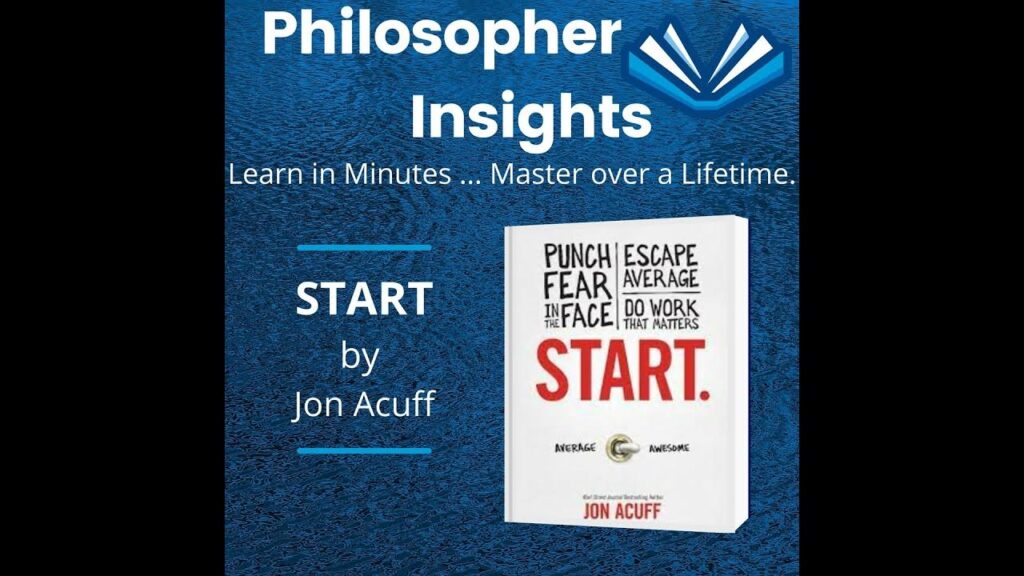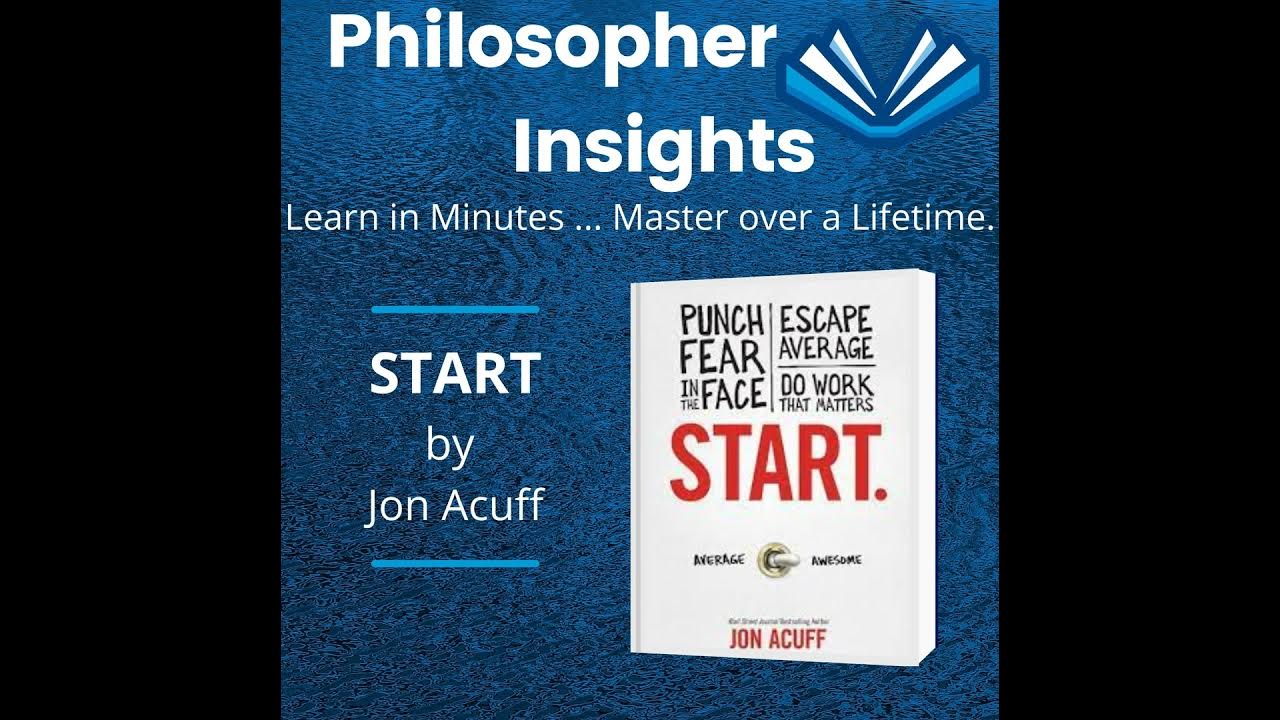
Start by Jon Acuff: A Practical Guide to Overcoming Perfectionism and Achieving Your Goals
Are you struggling to launch that project, write that book, or start that business? Do you find yourself paralyzed by the fear of not being good enough? If so, you’re not alone. Many people struggle with perfectionism, which can prevent them from taking the first step towards their goals. In his book, Start, Jon Acuff provides a practical and humorous guide to overcoming perfectionism and finally starting. This article will delve into the key concepts of Start by Jon Acuff, offering actionable insights and strategies to help you break free from the trap of perfection and begin your journey towards success.
Understanding the Enemy: The Grip of Perfectionism
Acuff argues that perfectionism isn’t about striving for excellence; it’s about the fear of failure and the belief that you’re not good enough. This fear can manifest in various ways, such as procrastination, overthinking, and analysis paralysis. Perfectionists often set unrealistic standards for themselves, leading to disappointment and discouragement. They believe that if they can’t do something perfectly, they shouldn’t do it at all. This mindset can be incredibly debilitating and prevent them from pursuing their dreams.
The core of the problem, as Acuff points out, is that perfectionism is a lie. It tells you that you need to be perfect before you can start. It whispers doubts and insecurities, making you question your abilities and potential. Recognizing this is the first crucial step in breaking free from its grip. Understanding that imperfection is not a flaw but a necessary part of the learning process allows you to embrace the journey and start moving forward.
The Five Stages of Awesome: A Roadmap to Success
Acuff introduces the “Five Stages of Awesome,” a framework for understanding the process of mastering any skill or achieving any goal. These stages are:
- Awareness: Recognizing that you have a goal and a desire to improve.
- Awkward: The initial stage of learning, where you’re likely to make mistakes and feel uncomfortable.
- Aware: Becoming more conscious of your strengths and weaknesses, and understanding how to improve.
- Awesome: Reaching a level of competence and confidence in your abilities.
- Automatic: Mastering the skill to the point where it becomes second nature.
By understanding these stages, you can reframe your expectations and embrace the awkwardness of the learning process. It’s crucial to remember that everyone starts somewhere, and even the most successful people have gone through the awkward phase. Embracing this reality allows you to start without the pressure of immediate perfection.
The Power of Small Steps: Breaking Down Overwhelming Goals
One of the key strategies for overcoming perfectionism is to break down overwhelming goals into smaller, more manageable steps. Acuff emphasizes the importance of focusing on progress, not perfection. Instead of trying to achieve everything at once, focus on taking one small step each day. This approach makes the goal feel less daunting and allows you to build momentum over time. By consistently taking small steps, you’ll eventually reach your destination.
For example, if your goal is to write a book, don’t focus on writing the entire book at once. Instead, start by writing one page each day. If your goal is to start a business, start by researching your market and creating a business plan. The key is to identify the smallest possible step you can take and then take it. These small wins will build your confidence and help you overcome the inertia of perfectionism. Starting small is not about settling for less; it’s about creating a sustainable path to achieving your full potential.
Embracing Imperfection: The Beauty of Done
Acuff argues that “done is better than perfect.” This doesn’t mean that you should settle for mediocrity, but rather that you should prioritize completion over striving for an unattainable ideal. Perfectionism often leads to procrastination because you’re constantly trying to make something perfect before you release it. However, in reality, most things are never truly perfect. By embracing imperfection, you can overcome this paralysis and start shipping your work. Feedback from the real world is far more valuable than striving for an imaginary ideal.
Releasing imperfect work allows you to learn and improve. You can gather feedback from your audience, identify areas for improvement, and iterate on your product or service. This iterative process is essential for growth and development. Trying to achieve perfection from the outset is often a recipe for disaster, as it can lead to wasted time and effort on features or aspects that ultimately don’t matter to your audience. Embrace the messiness of the process and start shipping imperfect work. [See also: The Importance of Iteration in Product Development]
The Art of Self-Compassion: Treating Yourself with Kindness
Perfectionists are often incredibly hard on themselves, constantly criticizing their efforts and focusing on their perceived flaws. Acuff emphasizes the importance of self-compassion, which involves treating yourself with the same kindness and understanding that you would offer to a friend. When you make a mistake, don’t beat yourself up about it. Instead, acknowledge it, learn from it, and move on. Self-compassion is essential for building resilience and overcoming the inevitable setbacks that you’ll encounter on your journey.
Cultivating self-compassion requires a conscious effort to challenge negative self-talk and replace it with more positive and supportive messages. Remind yourself that everyone makes mistakes and that it’s okay to not be perfect. Focus on your strengths and accomplishments, and celebrate your progress, no matter how small. By treating yourself with kindness, you’ll create a more supportive and encouraging environment for yourself, which will help you start and keep going even when things get tough. [See also: Building Resilience: A Guide to Overcoming Adversity]
Finding Your Tribe: The Power of Community
Surrounding yourself with a supportive community can be incredibly helpful in overcoming perfectionism. Acuff encourages readers to find their “tribe,” a group of people who will encourage and support them on their journey. These people can provide valuable feedback, offer encouragement, and help you stay accountable to your goals. Sharing your struggles and successes with others can help you feel less alone and more motivated to keep going.
Your tribe can consist of friends, family members, colleagues, or even online communities. The key is to find people who are genuinely invested in your success and who will provide you with honest and constructive feedback. Avoid surrounding yourself with people who are overly critical or negative, as they can reinforce your perfectionistic tendencies. Instead, seek out people who are positive, supportive, and encouraging. Having a strong support system can make all the difference in helping you start and achieve your goals. [See also: The Benefits of Community Support in Achieving Your Goals]
Practical Tips to Start Now: Actionable Strategies
Here are some practical tips inspired by Start by Jon Acuff to help you overcome perfectionism and start taking action:
- Identify your perfectionistic tendencies: Recognize the ways in which perfectionism manifests in your life, such as procrastination, overthinking, or setting unrealistic standards.
- Challenge your negative self-talk: When you catch yourself thinking negatively, challenge those thoughts and replace them with more positive and supportive messages.
- Break down your goals into smaller steps: Focus on taking one small step each day, rather than trying to achieve everything at once.
- Embrace imperfection: Prioritize completion over striving for an unattainable ideal.
- Practice self-compassion: Treat yourself with the same kindness and understanding that you would offer to a friend.
- Find your tribe: Surround yourself with a supportive community of people who will encourage and support you on your journey.
- Set realistic deadlines: Give yourself enough time to complete your tasks, but don’t allow yourself to get bogged down in perfectionism.
- Celebrate your progress: Acknowledge and celebrate your accomplishments, no matter how small.
- Focus on learning, not just achieving: View your mistakes as opportunities to learn and grow.
- Just start: The most important thing is to take the first step. Don’t wait for the perfect moment or the perfect conditions. Just start.
Conclusion: Start Today, Not Tomorrow
Start by Jon Acuff offers a powerful and practical guide to overcoming perfectionism and achieving your goals. By understanding the nature of perfectionism, embracing imperfection, and taking small steps forward, you can break free from the trap of fear and finally start living the life you were meant to live. Don’t let perfectionism hold you back any longer. Start today, not tomorrow. The world needs your unique talents and gifts, and you deserve to experience the joy of pursuing your dreams. So, take a deep breath, embrace the awkwardness, and start your journey towards awesome. Remember, starting is half the battle, and with the right mindset and strategies, you can achieve anything you set your mind to. Don’t be afraid to start; be afraid of never starting. Start by Jon Acuff provides the roadmap; it’s up to you to take the first step and start. The journey to success begins with a single step – start now! This guide helps you to start and continue, even when things get difficult. Stop waiting for the perfect moment, and start living your dreams today. So, what are you waiting for? Start!

